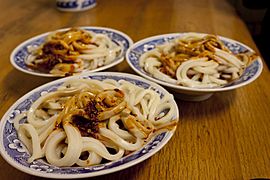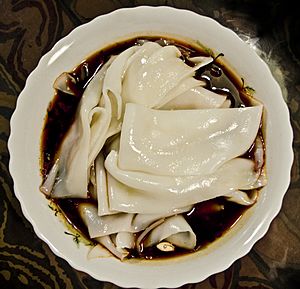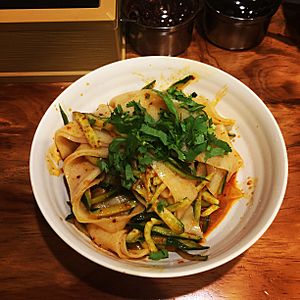Liangpi facts for kids
Quick facts for kids Liangpi |
|||||||
|---|---|---|---|---|---|---|---|

Liangpi
|
|||||||
| Traditional Chinese | 涼皮 | ||||||
| Simplified Chinese | 凉皮 | ||||||
|
|||||||
Liangpi (which means "cold skin" in Chinese) is a super popular Chinese dish. It's made from special cold, flat noodles. These noodles are usually created from wheat or rice flour.
Liangpi first came from Shaanxi Province in China. It's a special food from that area. But now, you can find it enjoyed all over China! In some parts of northwestern China, people call it liangpi zi. Even though it's served cold, people eat liangpi in every season, even in winter!
Contents
How to Make Liangpi: A Step-by-Step Guide
Making liangpi is a cool process. Even though its name means "cold skin," it doesn't have any animal products in it. Here's how it's often made:
Making the Dough
First, you mix wheat or rice flour with water and a little salt. This makes a soft dough.
Rinsing the Dough for Starch
Next, you put the dough in a bowl. You add water and "rinse" the dough. This rinsing washes out the starch from the dough. The water turns a milky white color as it fills with starch.
Separating the Starch
After rinsing, you take out the leftover dough. The milky water, full of starch, is left to sit overnight. It needs to be in a cool place. This resting time lets the starch settle to the bottom of the bowl.
Steaming the Noodles
The next day, you'll see a thick starch paste at the bottom. There will be clear water on top, which you pour away. Then, you take a small amount of the starch paste. You pour it onto a flat plate or tray. Spread it out very thinly and evenly.
The plate with the thin starch layer goes into a big pot. This pot has boiling water. The starch layer is steamed for a few minutes. It turns into a thin, soft "pancake." This pancake is then cut into long, noodle-like strips.
Different Kinds of Liangpi to Try
There are many tasty types of liangpi across China. Each one has its own special flavor and way of being served.
Hanzhong Liangpi: Served Warm
Hanzhong liangpi comes from the city of Hanzhong in Shaanxi. People sometimes call it Hanzhong mianpi. These liangpi noodles are steamed. They are often served with garlic and spicy chili oil. Unlike most liangpi, this type is usually served warm, not cold!
Majiang Liangpi: Sesame Paste Delight
Majiang liangpi is special because of its sauce. "Majiang" means sesame paste in Chinese. These noodles are topped with thin strips of cucumber. The sauce is made with salt, vinegar, hot chili oil, and lots of Chinese sesame paste. The sesame paste gives it a rich, nutty flavor.
Shaanxi Gan Mianpi: A Chewier Noodle
Shaanxi gan mianpi is another unique type. It has a firmer texture than other liangpi. It also looks a bit darker in color. Making gan mianpi takes a lot of effort. It involves washing the dough many times in cold water. This separates the gluten from the starch.
After washing, mostly gluten is left. This gluten can be boiled to make a chewy part called mianjin. The starch water is also boiled to thicken it. Then, it's spread on a pan and cooked like a pancake. Gan mianpi is always served with mianjin. It also comes with cooked vinegar, hot chili oil, salt, mashed garlic in water, and bean sprouts.
See also
 In Spanish: Liang pi para niños
In Spanish: Liang pi para niños
 | Roy Wilkins |
 | John Lewis |
 | Linda Carol Brown |



